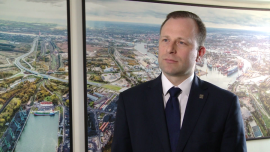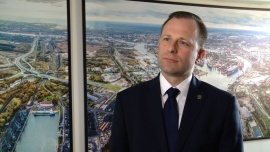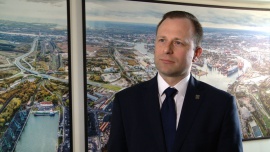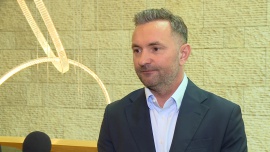All news
2018-06-19 | 05:00
Culture
Warsaw to see almost PLN 3.2 bn in investment spend this year. Most of this money will be allocated for transport, roads, and culture
This year, Warsaw is planning to spend more than PLN 3.2 bn on investment. A portion of these funds will be allocated to patch up Warsaw’s shortcomings in transport. The efforts will focus on the extension of the municipal transport system, including Line 2 of the Metro. A substantial amount of funds will be allocated for the extension of the educational and social infrastructure, as well as culture – including in particular Sinfonia Varsovia’s concert hall, the Museum of Modern Art and the Teatr Rozmaitości theatre. Warsaw’s authorities will also prioritise the fight against high emissions, including by getting rid of “dirty” stoves.
2018-06-18 | 05:00
Infrastructure
The Warsaw Chopin Airport is getting ready for growing numbers of passengers. This year, it might see a record number of passengers pass through.
The Chopin Airport is on the rise. About five million people passed through the airport by the end of April alone, with one in four passengers being transfer passengers. The year 2018 might bring a record number of more than 16 million passengers. To handle this growing traffic, the facility has to undergo a number of alterations. Once these alterations and extensions are completed, Chopin Airport might be able to handle a total of more than 50 aircraft operations an hour, a considerable increase from the current capacity of 42. Alterations will also include the terminals and the underground infrastructure.
2018-06-05 | 05:00
EU funds
Record-breaking investments in the Port of Gdansk. It is on its way to become the largest transhipment port on the Baltic Sea
In several years Gdańsk may become the largest deep-water port on the Baltic Sea. In this year alone, PLN 170 m will be allocated for dredging, quay extension, road and rail system modernisation and new car park construction projects. All these projects will be completed by 2020. By that time investments will have reached one billion zlotys. The projects will make it possible to multiply the potential of the Port of Gdansk and its transhipment capacity. In 10 years the Port of Gdansk might be handling transhipments of 100 million tonnes annually.
2018-05-14 | 05:50
Infrastructure
Committed to growing tourism, the Port of Gdańsk will add more services to Sweden.
“While the current number of passenger sea routes to Scandinavia is not impressive, ferry transport is becoming increasingly important for tourism. Tricity has a major chance for tapping this segment of the market,” said Marcin Osowski, Vice-President, Port of Gdańsk. With a massive EU-co-funded investment programme in place, the Port is also committed to growing tourism. As a first step, it will add more ferry services to Sweden.
2018-04-20 | 06:00
Technologies
The Polish transport sector underfunded. Local businesses spend much less on technology innovations compared to Western Europe
Polish companies continue to rely on traditional paper binders and Excel sheets to store their data, a study by TomTom Telematics finds. Traditional analogue tools are used by 40% of businesses. Only one in eight companies use telemetric systems to reduce their costs, ensure more efficient vehicle use and improve drivers’ safety. Polish companies spend much less on these measures than their counterparts in France and Germany. This problem is particularly pressing in the transport sector, where returns on investments show the quickest.
2018-04-18 | 06:00
EU funds
Polish ports are gaining foothold on the European transshipment market. Gdańsk is investing in infrastructure and hoping to take over some clients from German ports
The Seaport in Gdańsk is to invest PLN 600 m in two major projects supported by EU funds. These are to attract new clients within the Baltic Sea region, which is Europe’s fastest growing sea area. Transshipment volume in Polish ports is growing i.a. because of favourable economic conditions.
2018-04-13 | 05:50
Law
Poland has some of the strictest regulations on clean transport zones. Major European cities did not introduce such restrictions
The Act on Electromobility adopted in January doesn’t cover hybrid cars, which are increasingly popular on the Polish market. It also excludes plug-in hybrids, which allow switching the drive to electric, from accessing clean transport zones. No other country in Europe has ever introduced such strict regulations. Europe’s biggest cities such as Berlin and London initially allowed access to their clean zones for low-emission vehicles, and the criteria were gradually made more stringent.
2018-04-12 | 06:00
Environmental protection
In Poland, the idea of car-sharing is likely to catch on sooner than electric cars. The number of cars may drop by as much as 80 percent.
In 2017, the sales of electric cars in Poland, including plug-in hybrid cars, slightly exceeded 1000 vehicles, compared to several thousand sold in Norway or Germany. Despite the incentives envisaged in the new legal act, and the dropping prices of electric cars, they will hardly become common elements of the Polish road landscape in the nearest years. The car-sharing trend is likely to catch on far more quickly, and may lead to a drop in the demand for car ownership by even 80 percent.
2018-04-11 | 06:00
Transport
Poland has a chance of becoming Europe's transport hub. The chance lies in cooperation with China's largest private logistics operator
Trade between the EU and China is at a level of more than EUR 1 billion a day. Poland's contribution to this might become even greater as its trade with China continues to grow, with plans on the table to build a logistics hub in our country. Worldwide Logistics Group, a private logistics operator from China, has noticed this potential, and decided to partner up with ATC Cargo, a Gdynia-based company, to start its expansion into Europe. This cooperation is expected to create a major European player in logistics. This is a big chance for Poland, especially in the context of the New Silk Road project.









